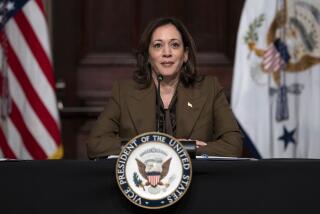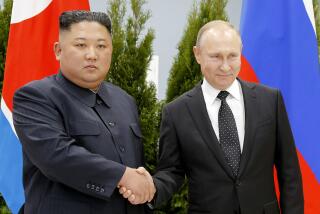Reagan Discounts Summit-Pact Link : Gorbachev Visit Now On Again, Officials Believe
- Share via
WASHINGTON — The latest diplomatic shift by Soviet leader Mikhail S. Gorbachev, who now seems to be prepared to come here without insisting on Reagan Administration guarantees to curb its space defense effort, appears to ensure that the much-anticipated third summit conference with President Reagan will take place, U.S. officials said Wednesday.
Two senior State Department officials said they believe that a Reagan-Gorbachev summit, which earlier had been expected in November, will take place before the end of the year in Washington, despite rumors that it might occur in a third country.
Signing Expected
The officials also believe that an agreement to eliminate intermediate-range missiles will be signed at that time.
All of the concessions that led to the scheduling of a visit here Friday by Soviet Foreign Minister Eduard A. Shevardnadze were apparently made by the Soviets. When Ambassador Jack F. Matlock Jr. met with Shevardnadze in Moscow to arrange the visit at the minister’s request, he was not authorized to offer any new American position, a U.S. official said.
In another measure of Soviet eagerness, a different official said, Shevardnadze offered to stay through Saturday on what will be his second Washington visit in six weeks, even though the Administration believes that the work can be completed in one day.
Why the Soviets reversed themselves on the summit issue for the second time in less than a week was no more clear than it had been the first time, officials said.
One theory is that Gorbachev was prevented by opponents in the Kremlin from setting a summit date last week. Another is that he calculated that Reagan’s domestic troubles, including the stock market plunge, could reap a quick windfall of concessions on arms issues by a White House desperate to rebuild its public image.
In any case, when the Soviets saw their strategy backfire, with virtually unanimous criticism of Gorbachev among North Atlantic Treaty Organization allies and in the United States, they moved quickly through public and diplomatic channels to change international perceptions by asking for a Shevardnadze invitation to Washington.
As the momentum built again toward progress in U.S.-Soviet affairs, the White House and State Department publicly took a cautious “wait-and-see” attitude toward Shevardnadze’s visit, in part because the official Soviet presentation to Matlock was more vague in content than semiofficial Soviet statements on the subject.
An official Soviet spokesman said in Moscow on Tuesday that Gorbachev would visit Washington when both sides reach “some agreements in principle” on long-range strategic missiles and space defense, as well as on an intermediate-range missile accord. The statement raised concern that the Soviets were still insisting on linking the summit to curbs on the Administration’s space defense program, the Strategic Defense Initiative.
But a senior Gorbachev aide, Anatoly F. Dobrynin, told the New York Times that the Soviet leader was prepared to meet Reagan to sign the medium-range missile accord “even if differences over the development of space-based defensive weapons remained unresolved.” All that Gorbachev now wants is Reagan’s “willingness to have a full discussion of outstanding issues about long-range strategic offensive arms and space defense weapons,” he said.
Dobrynin, who had been Soviet ambassador to the United States, also said that “there were no preconditions or ultimatums for a summit meeting in Washington, or a third country, other than Reagan’s willingness to discuss in full the question of defensive weapons and deep cuts in long-range missiles.”
Although Dobrynin read from a prepared statement, his remarks were paraphrased because he declined to be quoted directly. But Soviet diplomats in European capitals said much the same thing to the governments to which they are accredited, a U.S. official said.
Official Soviet statements to Matlock in Moscow “went in the same direction (as Dobrynin’s comments) but were less explicit,” the official added. “The message was to the effect: no preconditions on the summit, he (Gorbachev) was ready to come here to sign (the missile agreement). But we’ll wait to see what Shevardnadze actually brings.”
The two senior U.S. officials who expressed renewed optimism that the intermediate-range missile agreement will be signed at a summit here this year also predicted that an agreement cutting long-range offensive nuclear weapons by half will be reached by the middle of 1988.
Both sides have estimated that only two or three more weeks are required to complete the intermediate-range missile agreement, which will eliminate all those weapons with a range of 300 to 3,000 miles. Three verification problems involving on-site inspection are believed to be the main impediments left to that accord.
The far more difficult and significant issue deals with strategic long-range weapons that can strike the homelands of the other side.
Reagan and Gorbachev have agreed in principle to halve their strategic arsenals to 1,600 “delivery vehicles”--land-based missiles (ICBMs), submarine-launched missiles (SLBMs) and bombers--carrying a maximum of 6,000 warheads and bombs. The key outstanding issue in these negotiations concerns the sub-limits under those totals.
More to Read
Sign up for Essential California
The most important California stories and recommendations in your inbox every morning.
You may occasionally receive promotional content from the Los Angeles Times.













